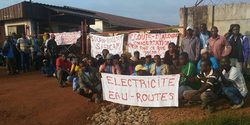Forest Watch | 10 April 2019
Historic legal win against corporate bullying in Paris
Historic legal win against corporate bullying in Paris
On 27 March 2019, French corporation Bolloré lost, on appeal, its defamation case against media outlet France Télévisions, an important win for those who would stand up to corporate bullying. Bolloré initiated proceedings in response to an award-winning 2016 documentary about Vincent Bolloré, one of the key shareholders of SOCFIN, a European palm oil and rubber company reputed for land-grabbing and violating the rights of communities living near plantations.
The documentary revealed the poor living conditions of workers and child labour in the plantations of SOCAPALM, a subsidiary of SOCFIN and the biggest palm oil company in Cameroon. Bolloré claimed the documentary was defamatory and demanded that France Télévisions pay the exorbitant sum of EUR 50 million in damages. Bolloré lost in first instance (TGI de Nanterre, 5 June 2018) in proceedings that journalists and news outlets claimed were initiated to silence their voices (FW 232).
The Court of Appeal in Paris (Pôle 2, ch. 7, n° 18/15647) has now agreed, condemning Bolloré for initiating “abusive proceedings” and ordering EUR 10,000 in damages to the television company.
This historic case does more than send a strong signal supporting freedom of the press: it is a notable recognition of the reality on the ground in Cameroon. For nearly a decade villagers living in the shade of SOCAPALM plantations or working for the company have struggled for their rights, urging the company to respect social and environmental justice and to return their land. Synaparcam, a community coalition representing more than 1,200 villagers asks SOCAPALM for inclusive dialogue to address serious concerns about land-grabbing and violations of community rights that often victimise women. A Synaparcam leader testified in Paris both in 2018 and 2019, a courageous act: his movements were monitored and he was followed. Another court case filed by Bolloré in Cameroon is still pending.
The situation is not rare. Despite voluntary adoption of social responsibility and zero deforestation policies on paper, some European companies’ actions are in stark contrast. This recent jurisprudence is remarkable, showing that the corporate giant does not always win. Yet the journalist, television company and communities in Cameroon should not have had to fight so hard and so long, and at such expense, for justice: structural change is needed.
The case underscores, again, the limits of voluntary social and environmental commitments. Fern believes change cannot be left to the brave few willing to confront daunting odds while the deck remains stacked against the most vulnerable: an EU action plan addressing deforestation and community rights is needed, including a regulation mandating company due diligence on human rights and environmental harm. Fern eagerly awaits the results of the consultation on EU action on deforestation that just closed.














